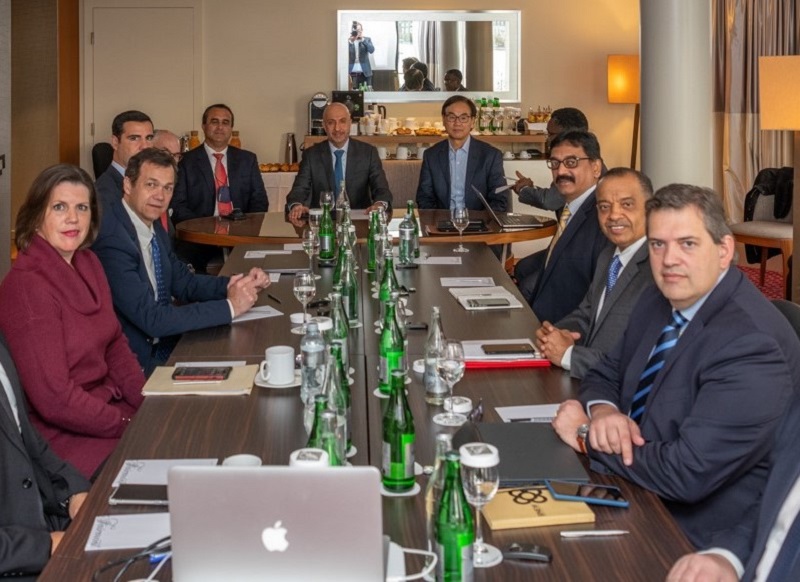World Free Zones Organisation (World FZO), a global not-for-profit organisation, held its annual Board of Directors meeting and a multilateral lateral organisations tour at Geneva, Switzerland, as part of its expansion and leadership growth strategies.
The meeting was attended by representatives from World Trade Organisation (WTO), United Nations Conference on Trade and Development (UNCTAD), International Road Transport Union (IRU), International Organisation of Employers (IOE), and International Labor Organisation (ILO).
Representatives from the World FZO were led by Dr. Mohammed Al Zarooni, Chairman and included José Contreras (Vice chairman, Dominican Republic), Emeka Ene (Secretary, Nigeria) and Martin Ibarra (Advisor to the board, Colombia).
During the meeting, the Board of Directors discussed areas for international integration and cooperation to enable global free zones enhance their economic strengths, highlight their important role in the global trade and supply chains, as well as overcoming challenges and creating opportunities for growth and prosperity in their commercial and labor markets.
Further, the taskforce will enable the World FZO to integrate the UN SDGs in all new and existing free zones and will extend its scope to companies managing fleet of vehicles moving across borders.
Dr. Mohammed Al Zarooni, Chairman of the World FZO, said: “Free zones across the globe play key roles in stimulating and reviving global trade and ensuring its sustainable investment flows. This has a direct impact on national economies such as providing job opportunities where free zones globally provide more than 80 million jobs.
“We believe that integration and cooperation with international organizations will double those opportunities, which will have a positive impact that benefits all parties. We also seek to enhance the security amid illicit trade practices through following the highest international standards by members and with implementing the best practices that are approved and shared by our organisation.”
The transport and movement of goods across borders experienced disruptions brought about by the COVID-19 pandemic. A report by the WTO shows a 10 to 20 per cent decline in the value of world trade of goods and services in 2020 due to the pandemic.
This further magnified the relevance of the nearly 4,000 free zones across the globe as accelerators of trade and economic growth.
With this, the taskforce with WTO will seek to re-build supply capacity, manage trade restrictions and promote digitalisation in supply chains. In addition, it will highlight the significance of investments in logistics and expand trade finance to strengthen contribution to economy recovery.
There is also a need to strengthen global value chain that caters to key sectors such as agriculture and food processing, pharmaceutical, information and communications technology, as well as health.
The World FZO also aims to advance its sustainability goals in line with the UN SDGs, hence, the taskforce with UNCTAD will leverage the Izdihar Index to encourage free zones to adopt eco-friendly and sustainable practices as well as to ensure a safe and secure work environment for employees to increase productivity, improve performance, ethics, morale, health and welfare. In addition, it will capacitate employees with technical knowledge and digital skills through the Digital Zone Certification Program, which is aimed at boosting business digital operations.
The Izdihar Index, which means prosperity in Arabic, is the main instrument of the Free Zone of the Future (FZF) Program launched by the World FZO as a tool that offers methods to identify areas of weakness within operational structure and measure peak performance.
In addition, the taskforce with ILO and IOE will help companies in reskilling and upskilling their workforce through different programs such as Online Management Diploma, Small, Medium, Enterprise Educational Program (SMEEP), and others.
Meanwhile, the World FZO will extend its reach to the International Road Transport Union (IRU) in a bid to assist its goal of promoting sustainability in its fleet of vehicles. Through the planned taskforce, transport and logistic companies crossing borders will adhere to Izdihar for a green and safe mobility, in line with the UN SDGs.
Commenting on the success of the meeting, José Contreras said: “There are many points discussed today and I look forward to seeing these results as we serve the needs of our stakeholders and partners. We will continue to work with other organizations to further give our members unrivalled access to world-class experience, network, services as well as in ensuring that they contribute to the development of the host countries.”
For years, the World Free Zones Organisation has been working with various organisations and other stakeholders to develop solutions, legislations, and tools for free zones around the world, and ensure the protection of international trade from illicit activities.

